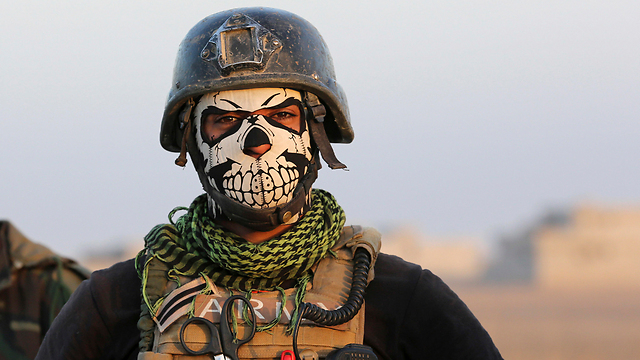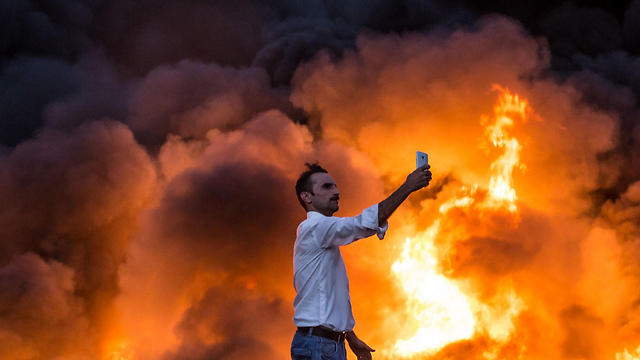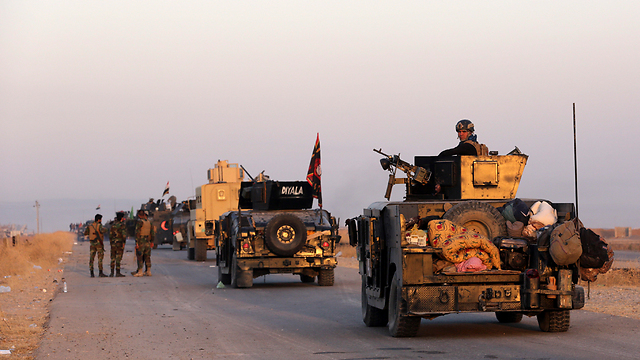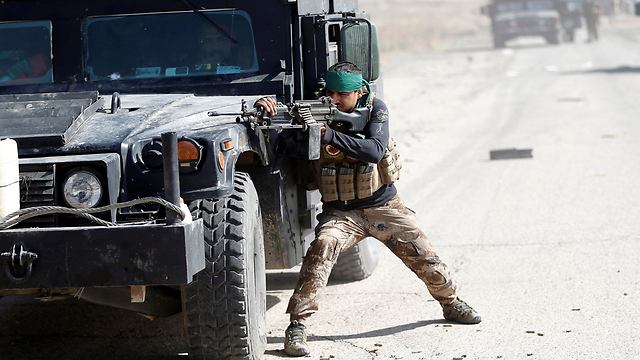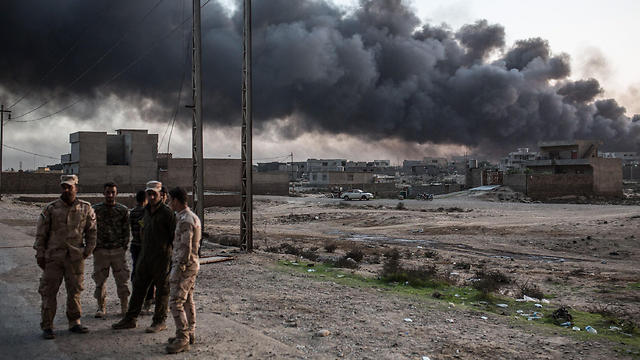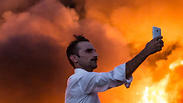

US soldier dies as Iraqi special forces join battle for Mosul
An American soldier has died in the battle for Mosul as a result of a roadside bomb; meanwhile, Iraqi Special Forces have joined the battle; they are causing division amongst the troops, refusing Kurdish requests to stop flying sectarian Shiite flags.
BARTELLA — In a significant escalation of the battle for Mosul, elite Iraqi special forces joined the fight Thursday, unleashing a pre-dawn assault on an ISIS-held town east of the besieged city, and the US military announced the first American combat death since the operation began.
US officials said the American service member died Thursday from wounds sustained in a roadside bomb explosion north of Mosul. More than 100 US special operations forces are embedded with Iraqi units in the offensive, and hundreds more are playing a support role in staging bases.
The American had been operating as an explosive ordnance disposal specialist in support of the Iraqi Kurdish force known as the peshmerga, the US officials said, speaking on condition of anonymity because they were not authorized to publicly discuss details.
Roadside bombs and other improvised explosive devices pose a particular danger to advancing Iraqi forces and the US advisers who are with them. The ISIS group, which has occupied Mosul for more than two years, has prepared extensive defenses in and around the city.
As they charged toward the town of Bartella, nine miles (15 kilometers) from Mosul's outskirts, the Iraqi special forces faced another favored weapon in the ISIS arsenal: armored trucks packed with explosives and driven by suicide bombers. The militants' signature battlefield tactic, the weapons offered a glimpse at what Iraqi forces can expect as they close in on the extremists' biggest urban bastion.
The pre-dawn assault on Bartella was part of a multi-pronged operation on eastern approaches to Mosul, Iraq's second-largest city. Attack helicopters strafed militant positions as they advanced amid a hail of gunfire.
The US-trained Special Forces, officially known as the Counter Terrorism Service, are widely seen as Iraq's most professional and least sectarian fighters, and have served as the shock troops in previous campaigns against ISIS. They are expected to lead the charge into Mosul.
ISIS militants unleashed at least nine suicide car and truck bombs against the advancing troops, eight of which were destroyed before reaching their targets, while the ninth struck an armored Humvee, Lt. Col Muntadhar al-Shimmari told The Associated Press.
He did not give a casualty figure, but another officer said five Iraqi soldiers were wounded. The officer spoke on condition of anonymity because he was not authorized to release information.
"After we break them in Bartella, everywhere else, they will crumble," said Maj. Gen. Fadhil Barwari. He said ISIS had few defenses in the town, which was almost completely empty of civilians. "They just left some snipers and suicide car bombs," he said.
Meanwhile, Iraqi Kurdish forces announced a simultaneous attack, with peshmerga fighters deployed on mountains northeast of Mosul descending from their positions and charging toward the front line.
Under cover of mortar and gunfire, the Kurdish troops used bulldozers and other heavy equipment to fill trenches dug by the militants as part of their defense of the ISIS-held village of Barima, then advanced with their armored vehicles toward the extremists' positions.
Military operations also appeared to be underway in the town of Bashiqa, northeast of Mosul, where thick smoke could be seen billowing up. A day earlier, Bashiqa was pounded by airstrikes and mortar fire from peshmerga positions high above.
Lt. Gen. Talib Shaghati told a news conference late Thursday that the Special Forces had succeeded in retaking Bartella. But Iraqi forces were still facing stiff resistance inside the town shortly before he spoke, and past advances against ISIS elsewhere in Iraq have often proved fleeting.
Soldiers stationed a few miles (kilometers) from Bartella said they watched as some 20 car bombs exploded in the town over the course of the day, each one sending a plume of smoke into the air. By late afternoon the skies over Bartella were black.
ISIS has used the tactic in past battles to wreak havoc among front line troops, but Iraqi forces have become better at stopping the suicide attackers.
"We destroyed the bombs with tanks," Sgt. Maj. Qusay Rashid said. "They are sending all these car bombs now because we're at the beginning of this huge battle. They are trying to put up their best defense."
After Bartella, Iraqi forces advancing toward Mosul will begin to hit villages and suburbs where civilians still live, a factor that will further complicate military operations that rely heavily on artillery and airstrikes to clear territory.
Mosul is home to more than a million people, and rights groups fear a potential humanitarian crisis.
Meanwhile, Prime Minister Haider Al-Abadi said Mosul may fall sooner than expected. The campaign to retake the city, which began Monday, had been expected to last weeks, if not months.
Speaking by video transmission to a conference in Paris focused on post-liberation planning for Mosul, the Iraqi leader said the Iraqi "forces are currently pushing forward ... more quickly than we thought, and more quickly certainly than we established in our plan of campaign."
The ISIS group captured Mosul and the surrounding area during a lightning advance across northern Iraq in the summer of 2014, and ISIS leader Abu Bakr al-Baghdadi announced the formation of a self-styled caliphate from the pulpit of a Mosul mosque.
Iraqi forces crumbled that summer, beating a humiliating retreat and leaving weapons and vehicles behind. But the Special Forces held together and fought back, and since then they have played a central role in retaking cities and towns from the extremist group.
The force was created by US Special Forces shortly after the 2003 invasion to hunt down top insurgents and stage commando raids, but its mandate has since expanded. Its members include Shiites, Sunnis and Kurds, and its human rights record is better than other forces taking part in the operation.
Mosul is a Sunni majority town, and many fear the involvement of state-sanctioned Shiite militias in the operation could stoke sectarian tensions. The Shiite militias have said they will not enter the city itself.
But even among the Special Forces there are traces of sectarian fervor. Many of the black Humvees that rode into battle in Bartella were decked with Shiite religious banners in addition to Iraqi flags.
Ali Saad, a 26-year-old Special Forces soldier, said Kurdish forces had asked them to take down the religious banners, but they refused.
"They asked if we were militias. We said we're not militias, we are Iraqi forces, and these are our beliefs," he said.














